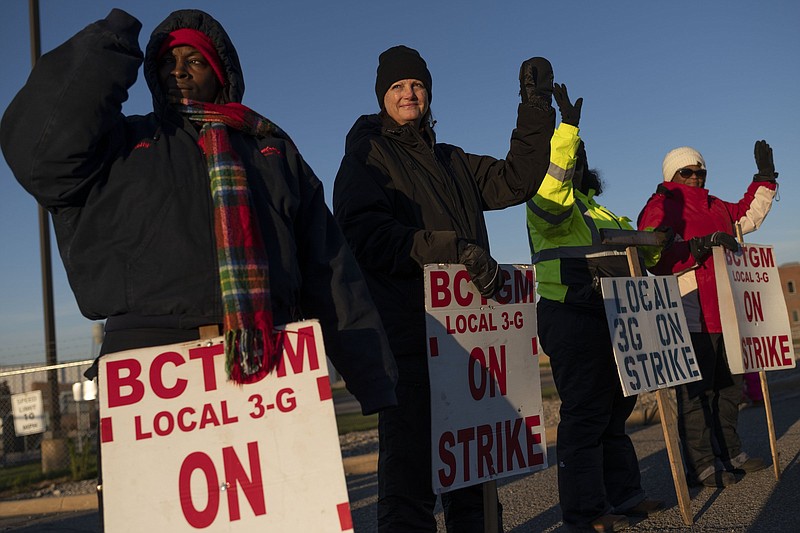OMAHA, Neb. — Kellogg Co. has reached a tentative agreement with its 1,400 cereal plant workers that will deliver 3% raises and end a nearly 2-month-long strike.
The five-year deal with the Bakery, Confectionary, Tobacco Workers and Grain Millers International Union also includes cost-of-living adjustments in the second through the fifth years of the contract and it maintains the workers’ current health benefits, the company said Thursday.
“The workers have won a lot,” said Rebecca Givan, an associate professor of labor studies and employment relations in the School of Management and Labor Relations at Rutgers University. “It certainly shows the success of going on strike.” Kellogg’s workers who have been on strike since Oct. 5 will vote on the new contract Sunday. The latest talks were the second round of negotiations after earlier discussions failed to reach an agreement.
The new deal covers workers at all its U.S. plants – in Battle Creek, Mich.; Omaha, Neb.; Lancaster, Pa.; and Memphis — that make all of Kellogg’s well-known brands of cereal, including Frosted Flakes and Rice Krispies.
Changes to the cereal-maker’s two-tier employment system had been a sticking point in negotiations. Currently at Kellogg’s cereal plants, longer-tenured “legacy” workers get better benefits and pay. “Transitional” workers can graduate into the higher class as legacy workers leave their jobs.
Kellogg had proposed eliminating the transitional concept, instead offering “immediate” pay increases for transitional workers based on years of service. The union had said these changes, while they would offer higher pay in the short term, would keep workers from reaching full legacy compensation.
The new agreement calls for immediate graduation to “legacy” status for all employees of four or more years, and a 3% graduation rate at each plant each year of the five-year contract. It also includes a 3% wage increase for legacy workers upon ratification, with cost-of-living adjustments thereafter, Kellogg said. Raises for transitional employees will depend on their years of service.
The union will have an informational meeting today to discuss the potential contract, president of the union chapter in Omaha.
Union President Anthony Shelton thanked all the members of the bargaining committee in a statement but he said workers “will have the final say on the contract.” Outside the Kellogg’s plant in Omaha, Eric Dwornicki said it is encouraging to see that a tentative agreement was reached, but the details of the deal will determine whether it will pass.
“We want to go back to work, but we don’t want to be taken advantage of,” said Dwornicki, 35, who has worked at the plant for nearly 10 years.
Dan Luers, who’s father worked at the plant for 22 years, said at least the agreement is a sign of progress after nine weeks on strike. Luers, 32, has worked at the Omaha cereal plant for 10 years.
Jerry Ellerman celebrated the 17th anniversary of when he started at the plant and his 50th birthday on the picket line in Omaha, but he said the strike won’t end unless it is a good deal.
“I’m willing to stay out here if it’s not fair,” Ellerman said.
Last month, Kellogg went to court in Omaha to secure an order that set guidelines for how workers behave on the picket line because the company said striking workers were blocking entrances to its cereal plant and intimidating replacement workers. Union officials denied any improper behavior.
The company has been using salaried employees and outside workers to keep its plants running during the strike, and it threatened last week to begin hiring permanent replacements for some striking workers.
But the union held out for higher wages after employees had been working long hours — more than 80 hours a week — over the past 18 months to keep up with demand during the coronavirus pandemic. And workers believed that the ongoing widespread worker shortages across the country gave them an advantage in the negotiations.
In another recent strike, more than 10,000 Deere & Co. workers secured 10% raises and improved benefits before returning to work last month.
Kellogg shares closed up 1.4% Thursday in New York. The stock was down 1.9% this year through Wednesday’s close, trailing a small gain in an S&P index of consumer-staple stocks.
Information for this article was contributed by Josh Funk of The Associated Press and by Deena Shanker of Bloomberg News (WPNS).
